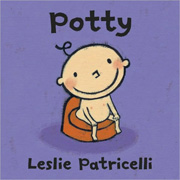 On average, an American baby will wear nearly 3,800 diapers. For disposable diaper users, that’s a lot of plastic for the landfill — plastic that will probably takes hundreds of years to degrade. For cloth-diaper users, that’s a lot of washing and water use. You may think that’s just the way it is. Babies have to wear diapers, right?
On average, an American baby will wear nearly 3,800 diapers. For disposable diaper users, that’s a lot of plastic for the landfill — plastic that will probably takes hundreds of years to degrade. For cloth-diaper users, that’s a lot of washing and water use. You may think that’s just the way it is. Babies have to wear diapers, right?
The diaper-free movement — pardon the pun — offers an alternative. Some call it “elimination communication” (EC); others prefer “natural infant hygiene”; whatever it’s called, it boils down to this: teaching babies to use a potty.
EC is by no means a new idea. Many indigenous cultures have avoided the use of diapers by holding babies continually and closely watching for infant cues. In parts of Africa, a mother might just lift the baby away and let him relieve himself before snuggling him back into her sling. Elimination communication has roots in a variety of cultures worldwide, and remains a common parenting practice in many parts of Asia, Africa and South America.
A baby on the toilet?
The basic method of EC begins with just being aware of your baby’s patterns and cues. Does your baby always seem to urinate when he first wakes? Does he tend to use his diaper after a meal? Paying attention to the expressions, noises and patterns of your child related to elimination is the first step.
When you think that your baby may need to eliminate, simply offer a “pottytunity” — a chance to use a potty instead of a diaper. This can entail sitting the baby on a toilet, potty seat, bowl or even a sink — anything that allows you to skip the interim step of using a diaper. At the same time, you will want to provide some sort of cueing sound to help your baby learn that this means potty time. “Psss” is a popular cue as it sounds a bit like the familiar noises a baby might hear while successfully using a potty.
This may all sound like a lot of work, and it can be. If you are very committed to being “diaper free,” you’ll spend a good deal of time attending to your baby’s cues and offering her ample “pottytunities.” But EC can be an easy thing to incorporate into any baby’s life on a partial level; you can offer a potty whenever you change a diaper, just once a day, or even just once a week, and still realize benefits.
No pressure
Those who advocate EC want to be very clear: It’s not a high-pressure event. Introducing an infant to the potty should always be gentle. Proponents even use a set of terms to help reduce the pressure. Rather than making a big deal about success, parents are simply trying to “catch” the products of elimination. If elimination occurs and is not “caught” by the parent, it’s simply a “miss.” There is no discussion of accidents or anything else that suggests blame.
Bothell mom Marissa Corless found that introducing EC into her life with her third child was easier than she expected. “A day in the life of EC was the same as the day in the life of a mom with a baby, except rather than the stops to change a diaper, it was a potty stop,” she says.
Want to give it a try, but feel intimidated? Perhaps a look at the benefits of EC will inspire you.
It’s green. It stands to reason that if you are catching the products of elimination, your baby goes through fewer diapers. Using fewer diapers saves on landfill space, water use or both. Corless found that she did indeed save on diapers by taking her child to the potty regularly. “We averaged two or three diapers every 24 hours with my EC’d child as opposed to the six to eight cloth diapers per day my other two children averaged.”
Kirkland mom Lindsay Godfrey found that she used one or two diapers a day with her baby while practicing EC, and her son was out of diapers entirely at 21 months. “More importantly,” says Godfrey, “is that after eight months, all but about four poops were done on the potty, and so were completely disposed of in the toilet. His bottom did not get soiled as with a diaper, so we could use toilet paper rather than wipes. Stool in landfills is a toxic waste that seeps into water tables, but the sewage system properly handles such waste.”
According to the American Public Health Association, human feces can contain viruses that can live for months, and fecal matter in disposable diapers can pose a risk to ground water. Experts say the best place to dispose of stool is in the toilet, and families that practice EC are making sure that happens far more often.
It improves parent and child communication. Many of those who practice EC say that part of their inspiration is the desire to show empathy for their children, and enhance communication and connection. Heidi Watters of Tukwila says she practiced EC with her daughters in part out of a desire to respond sensitively to her children’s needs. “I’ve heard lots of parents say, ‘Oh, look who’s filling their drawers!’ so clearly they know when their kid is going. It’s not too big a stretch to just put the child on the potty at those times. No one likes to clean up after a poopy diaper or wear a toilet,” says Watters.
It expedites transition out of diapers. Even the most die-hard diaper-free proponent will tell you that it’s not about potty training in the Western sense. They will warn you not to follow this path if your only goal is to have a potty genius. Instead, EC is about communication with your child. But the fact is that most of this communication leads to a gentler and earlier transition out of diapers.
“With EC, the primary goal is tuning in to the child’s needs and taking care of them in a hygienic manner,” explains Godfrey.
Godfrey’s 2-year-old has learned about the diaper-free options to elimination so well that he doesn’t actually seem to remember that a diaper is an option! “If I put a diaper on because we are traveling, he tells me when he needs to pee and waits until I remove it to go,” she comments.
Fans of EC often have such stories, and it makes sense. Rather than training a child to use a diaper as the primary place for elimination, and then later trying to change everything completely by offering a potty, parents who practice EC are offering a potty sooner, when the child is first learning where elimination takes place.
“It’s just another option,” says Jenn Wood of Wallingford. “We spend two or more years teaching babies to use a diaper for elimination. Then suddenly we tell them not to use a diaper, but to use a new contraption we call a potty. And we wonder why they sometimes have trouble!” Wood offered her daughter, Malia, a chance to use a potty as an infant, and Malia no longer needed diapers during the day or night by the time she was 19 months old.
Logistical issues
Some parents disdain diapers in their entirety and tolerate a little pee on the floor now and again. Many get past the concern about misses in beds and on clothes by putting babies on an absorbent pad to make cleanup a little easier. Others just give their babies a chance to eliminate during the course of a normal diaper change. Maybe a baby urinates every time his diaper is removed. His mom might realize she could catch that urine each time (rather than dodge it) and puts baby on the potty at every diaper change. Some parents just take baby to the potty regularly enough that baby starts to wait for that opportunity to go.
Small potties, large toilets, bowls, sinks and buckets have all been used with success by a number of families. If you find that running down the hall to a sink with a naked baby is not going to work, try putting a small potty at your changing table. A potty in the playroom might just be the perfect way to make sure that frequent pottytunities occur. Some people bring potties in the car or even carry a little bowl in the diaper bag.
Because there are so many variations on EC, there are a number of solutions to logistical issues. At the same time, there is no script that everyone can follow. When logistics remain in doubt, it can be helpful to do some reading or find support from others who practice EC.
Diaper-free friends
If by now you are sold on the idea, you need not be the only person in your social circle who takes her baby to the sink to pee at a restaurant or carries a small potty in your diaper bag. There are regular meetings and e-mail groups in the Puget Sound area for EC support (see sidebar), and they will tell you it’s never too late to join the movement.
Freelance writer and past executive director of Great Starts Birth & Family Education Tera Schreiber is a part-time practitioner of elimination communication with her infant daughter and only wishes she had known about it before her two older kids were born.
Going diaper free
DiaperFreeBaby
DiaperFreeBaby Online
Diaper Free!
The EC Store











